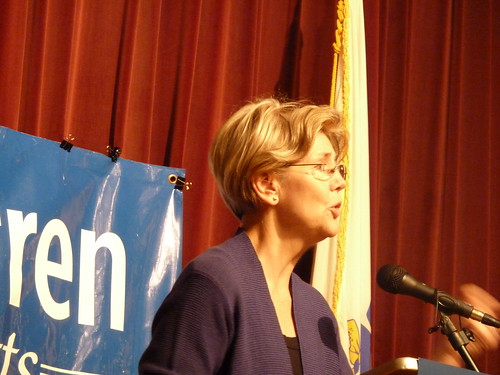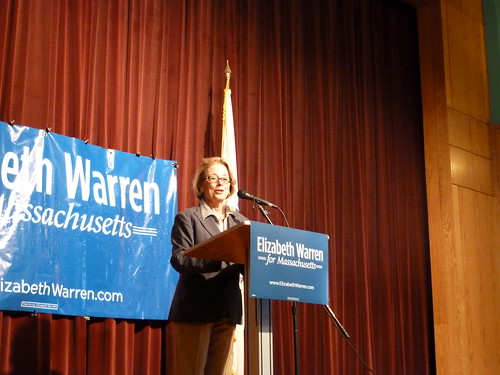Elizabeth Warren in Lowell

Elizabeth Warren
When, at the end of her introduction of Elizabeth Warren at the Butler Middle School today in Lowell, Congresswoman Niki Tsongas said “They will rue the day they didn’t appoint her” to lead the Consumer Financial Protection Bureau, she tapped into the enthusiasm of the overflow crowd and of the primary reason many are so excited about Warren’s candidacy. That those responsible for driving our economy into a ditch were so adamantly opposed to her holding a powerful position in Washington is, to me, a strong argument for sending Elizabeth Warren to the United States Senate.
This was the first time I’ve seen Warren in person and she met and exceeded my expectations. She began by recounting her life story which, as she explained afterwards, is central to not only her campaign but to her vision of America. As most know by now, Warren was born in Oklahoma. Her father was a salesman who became a maintenance worker until he had a heart attack, an event that plunged the family into an even more precarious financial position. Elizabeth got her first job at age 9, rocking a neighbor’s colicky baby for 35 cents per hour and was waiting on tables by age 13. She attended a public university, married at 19, had her first child at 22, and became a special needs teacher after graduation. Two years later she began law school, which began what certainly seems like a life-long love of the law. At graduation, she was 9 months pregnant and ended up practicing law out of her living room after passing the bar. As she put it, her clients weren’t Fortune 500 companies but friends and neighbors most of whom were experiencing financial difficulty. Soon she returned to teaching as a law school professor. Most of her courses dealt with money – contracts, bankruptcy, and finance. Her research interest was American families and their finances. Through the years, she taught at five law schools, the last of which was Harvard where she remains on the faculty.
To Warren, her life’s trajectory epitomized America as it was: a kid from Oklahoma, educated in public universities, ends up on the faculty of one of the top universities in the world. Warren explained that this was no accident, that in the aftermath of the Great Depression, America collectively did two great things. First, it stopped the boom and bust economic cycles that had plagued our country since its founding through regulatory institutions such as the FDIC, the Securities and Exchange Commission, and the Glass-Steagall Act. Second, we made the societal investments necessary to build a strong middle class, the most of important of which was educational expenditures to public school and universities and through the GI Bill. Our country also made massive investments in infrastructure for transportation, power, water, sewer and so much else, expenditures that benefited everyone. For fifty years, the middle class in America grew and thrived.
A generation ago, according to Warren, “we lost our way.” The ascendent philosophy of government became “I’ve got mine and the rest of you are on your own.” The situation today, with extremely profitable companies paying no taxes while students go deeper into debt to pay for their education and seniors are told to get by with less, is symptomatic of this. As Warren put it, this coming election is about answering the question, “What is America?” The election is a decision about America’s future: will we return to the post-Great Depression, post-World War Two policies that created a strong, vibrant, expanding middle class or will we stick with the policies of the last generation that have decimated that middle class and concentrated more and more wealth in the hands of fewer and fewer individuals.
Warren then relinquished the podium to her field director, Matt Patton, who went through all the steps those in attendance can take to help the campaign, beginning immediately. More information about the campaign is available on Warren’s website, elizabethwarren.com.

Niki Tsongas introducing Elizabeth Warren
We need hundreds of public intellectuals like Elizabeth Warren inconveniencing themselves by standing for office. She’s sending a message to people like her: It’s time to take what we know and apply it in the political system ourselves by offering to be representatives of the voters. Daniel Patrick Moynihan was another example. And Paul Wellstone of Minnesota.
There were actually a few more empty seats than I would have liked to see. I think a couple of factors contributed: that the details of the meeting were announced very last minute, and that Merrimack Valley is frankly going to be a bit of a tough sell for her.